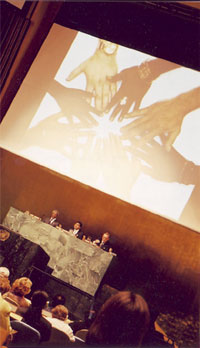UN Reform
UN Reform –- Introduction
While the words of the Preamble of the United Nations’ Charter is as vibrant and inspiring as ever, the subsequent rules and regulations for the establishing of an “international machinery for the promotion of the economic and social advancement of all peoples” is in today’s globalising world showing its age.
But, although there is general agreement on the need for change, the political will to bring about such changes is lacking – not least among the permanent members of the UN Security Council. The concepts of state sovereignty and the sovereign status of the individual human being are being challenged to reform and transform. Rights and responsibilities are issues that confront us all.

In 1995, Oxford University Press published the Report of the Commission on Global Governance “OUR GLOBAL NEIGHBOURHOOD”, which dealt comprehensively with the issue of UN reform and offered proposals for such reforms. It also made it clear that the UN is us – all of us: UN reflects our shortcomings and the issues that we, governments and peoples alike, must show the willingness to solve together.
The report says that: “when governments or people speak of reform of the United Nations, they address a process of change that has to begin in national behaviour, not on the banks of the East River in New York. National behaviour is a product of national decision-making and national policies: it is here that strengthening of the UN must begin.”
Based upon the thoughts and proposals submitted by non-governmental organizations and other civil society organizations from throughout the world, a “We the Peoples Millennium Forum Declaration and Agenda for Action” was prepared and presented in the year 2000 as the contribution by the world’s peoples to the Millennium Summit, New York September 2000.
This Declaration states: “In our vision we are one human family, in all our diversity, living on one common homeland and sharing a just, sustainable and peaceful world, guided by universal principles of democracy, equality, inclusion, voluntarism, non-discrimination and participation by all persons, men and women, young and old, regardless of race, faith, disability, sexual orientation, ethnicity or nationality”.
The reform and the transforming of the United Nations is gaining momentum in the 21st century.
PEACE THROUGH UNITY INITIATIVE FOR A NEW ZEALAND FORUM FOR UN REFORM
